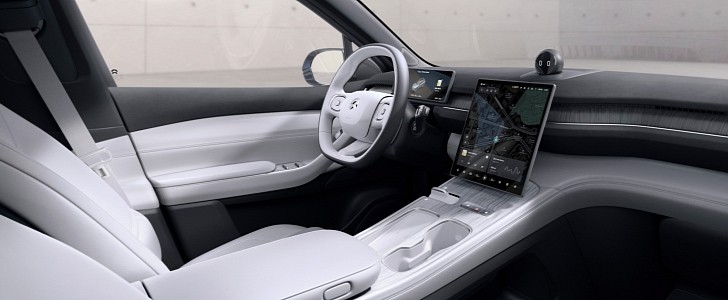NIO, one of China’s most promising EV startups, is trying to copy Tesla’s vertical integration model. According to Chinese media, NIO is working on developing its own self-driving and LiDAR chips and has a strong team already.
Tesla took the automotive industry by storm with its novel ways of developing and building cars. The level of vertical integration, specifically, is unlike anything seen by traditional carmakers before. Instead of relying on suppliers and off-the-shelf parts and software to build its vehicles, Tesla makes almost everything in-house. The model worked out well, especially in light of electronic chip shortages, allowing Tesla to quickly adapt and repurpose different chips for the task.
The legacy automakers are too entrenched in the status quo to be able to change their production model, but new car startups are sure to notice. NIO and other Chinese startups are working hard at developing their chips in-house. NIO has already assembled a 300-engineer team working to make self-driving and LiDAR chips.
According to CnEVPost, NIO’s team started in the second half of 2020 under its smart driving hardware division. The team leader comes from Huawei’s HiSilicon chip division, having joined NIO in the first half of last year. The first assignment would be developing two kinds of chips: high-level self-driving chips and LiDAR chips.
As of now, the company hasn’t made significant progress. NIO’s self-driving chips are not yet at the tape-out stage, which is the final design phase before going into production. To speed things up, NIO tries to lure top talents with payments that are way above the industry average. According to the reports, the new chips should be ready for use in production vehicles starting as early as 2024.
At the same time, NIO’s LiDAR chips are developed by the company in partnership with its LiDAR supplier Innovusion. All three models based on NIO’s NT 2.0 platform, ET7, ET5, and ES7 (named EL7 in Europe), use LiDAR sensors supplied by Innovusion. LiDAR hardware uses computer chips for sending and receiving lasers, ranging, and multi-sensor data fusion. According to the reports, NIO may have already developed one or several of these modules.
The legacy automakers are too entrenched in the status quo to be able to change their production model, but new car startups are sure to notice. NIO and other Chinese startups are working hard at developing their chips in-house. NIO has already assembled a 300-engineer team working to make self-driving and LiDAR chips.
According to CnEVPost, NIO’s team started in the second half of 2020 under its smart driving hardware division. The team leader comes from Huawei’s HiSilicon chip division, having joined NIO in the first half of last year. The first assignment would be developing two kinds of chips: high-level self-driving chips and LiDAR chips.
As of now, the company hasn’t made significant progress. NIO’s self-driving chips are not yet at the tape-out stage, which is the final design phase before going into production. To speed things up, NIO tries to lure top talents with payments that are way above the industry average. According to the reports, the new chips should be ready for use in production vehicles starting as early as 2024.
At the same time, NIO’s LiDAR chips are developed by the company in partnership with its LiDAR supplier Innovusion. All three models based on NIO’s NT 2.0 platform, ET7, ET5, and ES7 (named EL7 in Europe), use LiDAR sensors supplied by Innovusion. LiDAR hardware uses computer chips for sending and receiving lasers, ranging, and multi-sensor data fusion. According to the reports, NIO may have already developed one or several of these modules.





